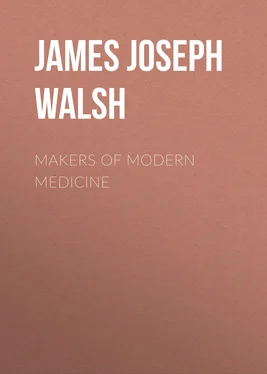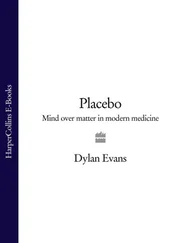James Walsh - Makers of Modern Medicine
Здесь есть возможность читать онлайн «James Walsh - Makers of Modern Medicine» — ознакомительный отрывок электронной книги совершенно бесплатно, а после прочтения отрывка купить полную версию. В некоторых случаях можно слушать аудио, скачать через торрент в формате fb2 и присутствует краткое содержание. Жанр: foreign_prose, Медицина, foreign_antique, на английском языке. Описание произведения, (предисловие) а так же отзывы посетителей доступны на портале библиотеки ЛибКат.
- Название:Makers of Modern Medicine
- Автор:
- Жанр:
- Год:неизвестен
- ISBN:нет данных
- Рейтинг книги:3 / 5. Голосов: 1
-
Избранное:Добавить в избранное
- Отзывы:
-
Ваша оценка:
- 60
- 1
- 2
- 3
- 4
- 5
Makers of Modern Medicine: краткое содержание, описание и аннотация
Предлагаем к чтению аннотацию, описание, краткое содержание или предисловие (зависит от того, что написал сам автор книги «Makers of Modern Medicine»). Если вы не нашли необходимую информацию о книге — напишите в комментариях, мы постараемся отыскать её.
Makers of Modern Medicine — читать онлайн ознакомительный отрывок
Ниже представлен текст книги, разбитый по страницам. Система сохранения места последней прочитанной страницы, позволяет с удобством читать онлайн бесплатно книгу «Makers of Modern Medicine», без необходимости каждый раз заново искать на чём Вы остановились. Поставьте закладку, и сможете в любой момент перейти на страницу, на которой закончили чтение.
Интервал:
Закладка:
Shortly before noon of the day of his death he looked at the clock in his room and said that when the hands would point to two o'clock he would be no more. His prophecy came true.
Vienna has never had the reputation of honoring its great geniuses during their lifetime, unless they happened to belong to the higher nobility. The exclusiveness of court society at the capital made itself felt in all circles, and the consequence was that genius sprung from the lower orders was almost sure not to receive its due share of attention. The comparative neglect of Auenbrugger does not seem so bad when we recall the case of Mozart. Music has always been one of the special fads of the Austrian and the Viennese pride themselves on their appreciation of it. Mozart, however, perhaps the greatest musical genius that ever lived, received some attention during his life, but passed away almost unnoticed at the early age of thirty-five, was buried in a common trench with the poor people of the city, and now Vienna cannot find his resting place. There is a magnificent monument to him, but his bones lie with his own people forever.
Outside the circle of his personal friends Auenbrugger did not receive much attention, so that even the year of his death was until recently more or less uncertain and the resting place of his remains continues to be unknown. The present generation of medical men has done more to afford the due meed of praise to Auenbrugger than any preceding generation. The interest in tuberculosis particularly has led medical men to appreciate all the significance of Auenbrugger's work, and the practical importance of his discovery for the early recognition and consequently for the cure of the disease. The appreciation of Auenbrugger in our time has been so flattering as quite to make up for previous neglect. His name has been linked with that of Laennec as the great discoverers of physical diagnosis in chest diseases.
At the opening of his address as President of the American Climatological Association, some five years ago, Dr. Edward O. Otis, of Boston, said:
"It is quite improbable, I think, that we should be here to-day, or, indeed, have an existence as a society largely devoted to the consideration of diseases of the chest, were it not for the methods of thoracic examination which Auenbrugger and Laennec have given us in their discoveries of percussion and auscultation. Without these two precious methods of investigation we could scarcely have arrived at any degree of precision or certainty in thoracic pathology and might have been not unlike the old physicians and surgeons, 'who would swear,' as Morgagni says, 'that there was fluid in the chest when in reality there was not a single drachm, or perform paracentesis of the thorax upon a duke for an empyema which did not exist.'"
His tribute is only an echo of many others not less appreciative of Auenbrugger's important original work than have been expressed by modern medical men of all nations. The simple old German practitioner, who had the annoyance of seeing his discovery neglected by his contemporaries for so many years, has at last come into his own. There is scarcely an important medical meeting held anywhere in the world in which diseases of the chest are discussed without a mention of Auenbrugger's name. This is not surprising in Germany, but is quite as true of France, and England, and America. As Dr. Otis said, in closing the address from which we have just quoted:
"Although we possess but meagre and fragmentary records of Auenbrugger's life, there is yet enough to enable us to fill in the lines and gain a distinct idea of his personality and character. With some persons one does not need to be acquainted with much of the detail of their lives in order to know what manner of men they are; a few characteristic illustrations here and there in their career redeem the spirit and motives of their lives, and show the kind of men just as they are, quite as well and clearly as an extended and continuous biographical narrative. Always enthusiastically devoted to the study of disease, Auenbrugger escaped the not infrequent misfortune of the student, a loss of sympathy with one's kind. His love for his fellow-men, for suffering humanity, for struggling students in his own profession, kept pace with his love for medical study. He never sacrificed the man for the scientist, nor did he lose his interest for other things in life, as happens sometimes with men intensely devoted to one pursuit. A man of original powers, as some one has truly remarked, can never be confined within the limits of a single field of activity.
"He was interested in music, philosophy and the drama, and well illustrates what Dr. Da Costa has so happily styled 'the scholar in medicine.' With dignity, sympathy, enthusiasm in his profession, even to the last; ever seeking to improve and add to his art; modest, like most great men; never refusing to give what is best to suffering humanity, he richly lived out his long life. As we teach our students percussion, as a matter of just recognition and due honor let us tell them something of the life of the discoverer, and at least his name, which I fear but few, who avail themselves of the result of his long and arduous labors, know."
Auenbrugger's German biographer, Professor Clar, of Gratz, says of his early life that from his parents he received an excellent early training, especially edifying because of the exemplary Christian family life he saw about him, the piety of his father and mother, and of the other members of the family. The baptismal register of the parish church at Gratz is one of the important documents in his life history, for there is some dispute as to the exact date of his birth, as there is also with regard to his death. In 1798 he suffered from a severe attack of typhus fever, which at the time was epidemic in Vienna, and some of his biographers report his death in this year as a consequence of it. His descendants, however, have shown, by the burial register of the parish church in Vienna, that his death did not take place until May 17, 1807; from this church, of which he had been for half a century a faithful member, he was buried.
Few of the lives of the great discoverers in medicine have in them more of encouragement for the busy practitioner of medicine than that of Auenbrugger. He began his medical career by a series of practical observations that stamped him for all time as one of the great geniuses. When his discoveries failed to meet with the acceptance they deserved, he was not disturbed, and, above all, he did not insist on acrid controversy. He took up the practice of medicine and demonstrated how much his discovery could help in the diagnosis of the obscure chapter of the diseases of the chest. In the mean time he went on his way placidly doing the good that he found to do, taking care of his poor patients and faithfully tending brother-physicians who happened to be ill. He found an avocation to fill the moments spent apart from his vocation, and added to the pleasure of humanity by his work in music. All the time he remained a simple, faithful believer in the relation of Providence to man, and considered that somehow the inexplicable things of this life would find an explanation in the hereafter. He was probably the best-liked member of the profession in Vienna during his lifetime, and the profession of his native town are very proud to recall the example that he sets physicians generally in all the ethical qualities that make a physician's life not only successful in the material sense, but also in inspiration for those around him to do their duty rather than seek the fulfilment of merely selfish aims.
EDWARD JENNER, THE DISCOVERER OF VACCINATION
"It helps a man immensely to be a bit of a hero worshipper, and the stories of the lives of the masters of medicine do much to stimulate our ambition and rouse our sympathies. If the life and work of such men as Bichat and Laennec will not stir the blood of a young man and make him feel proud of France and of Frenchmen, he must be a dull and muddy-mettled rascal. In reading the life of Hunter, of Jenner, who thinks of the nationality which is merged and lost in our interest in the man and in his work! In the halcyon days of the Renaissance there was no nationalism in medicine, but a fine catholic spirit made great leaders like Vesalius, Eustachius, Stenson and others at home in every country in Europe."
Интервал:
Закладка:
Похожие книги на «Makers of Modern Medicine»
Представляем Вашему вниманию похожие книги на «Makers of Modern Medicine» списком для выбора. Мы отобрали схожую по названию и смыслу литературу в надежде предоставить читателям больше вариантов отыскать новые, интересные, ещё непрочитанные произведения.
Обсуждение, отзывы о книге «Makers of Modern Medicine» и просто собственные мнения читателей. Оставьте ваши комментарии, напишите, что Вы думаете о произведении, его смысле или главных героях. Укажите что конкретно понравилось, а что нет, и почему Вы так считаете.












